|
|
|
Sort Order |
|
|
|
Items / Page
|
|
|
|
|
|
|
| Srl | Item |
| 1 |
ID:
132928
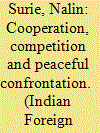

|
|
|
|
|
| Publication |
2014.
|
| Summary/Abstract |
The India?China relationship is already not a zero sum game. The potential for collaboration to mutual benefit though is much greater whether from the perspective of learning from each other's socio economic programs and successes, for bilateral economic relations or cooperation in regional and international programs. However, for this to be realised in greater and greater measure will require the development of much greater mutual trust and a mindset change, especially in our largest neighbour
|
|
|
|
|
|
|
|
|
|
|
|
|
|
|
|
| 2 |
ID:
181669
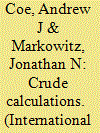

|
|
|
|
|
| Summary/Abstract |
For many centuries, conquest was commonplace, and its attractiveness was central to the character of international politics. Why has it declined? Existing theories cannot explain why powerful countries no longer conquer states with easily extractable wealth. We develop an explanation based on the relationship between a potential conqueror's economic productivity and its ability to profit from conquest. Productivity has opposing effects on conquest's profitability: it raises the opportunity cost of each asset diverted to conquest, but also reduces the quantity of assets required for conquest. The net effect is determined by the composition of investment in innovation. We document that since at least 1950 investment has been predominantly aimed at civilian, not military innovations, so that rising productivity should reduce conquest's net profitability. Using cost analyses of comparable wars, we estimate bounds on the profitability of conquering the oil and gas reserves of the Persian Gulf, a very tempting target, for the United States and Iraq, two potential conquerors of widely differing productivity. Though both mechanisms operate, we find that the net effect of higher productivity is to reduce the profits from conquest. Moreover, this net effect is large enough to render conquest generally unprofitable for contemporary high-productivity states.
|
|
|
|
|
|
|
|
|
|
|
|
|
|
|
|
| 3 |
ID:
137821
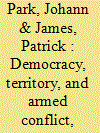

|
|
|
|
|
| Summary/Abstract |
Democracy and territory are two of the most important factors that affect conflict and war. Yet no research design looks directly at a possible interaction between these two variables to influence occurrence of armed conflict. This study seeks to answer the following question: “How do two democracies behave when a contentious issue such as territory arises as the source of conflict between them?” Results based on Militarized Interstate Dispute data from 1920 to 1996 produce the conclusion that the pacifying effect of democracy stands up for both territorial dyads and non-territorial ones in spite of the imperatives toward militarization created by territorial conflict. However, territory of high salience still appears to increase the likelihood of armed conflict between two democracies.
|
|
|
|
|
|
|
|
|
|
|
|
|
|
|
|
| 4 |
ID:
172831
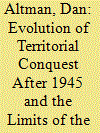

|
|
|
|
|
| Summary/Abstract |
Past studies conclude that a territorial integrity norm caused territorial conquest to decline sharply after 1945, virtually subsiding after 1975. However, using new and more comprehensive data on territorial conquest attempts, this study presents a revised history of conquest after 1945. Unlike attempts to conquer entire states, attempts to conquer parts of states remained far more common than previously recognized. More than conquest declined in frequency, its relationship with war evolved. Challengers attempting conquest before 1945 often initiated a war, then sought to occupy large territories. Today, challengers more often seize small regions, then attempt to avoid war. Adopting this strategy, the fait accompli, challengers increasingly came to target territories with characteristics that reduce the risk of provoking war—such as a low population and the absence of a defending military garrison—but challengers nonetheless take a calculated gamble. In part because seizures of smaller territories with such characteristics have not declined, the operative constraint appears to be against war-prone aggression, not territorial revision. The evolution of conquest is a symptom of war's decline, not its cause. Most of the evidence that the territorial integrity norm suppressed conquest or war withers under investigation with new data. Attempts to get away with seizing small pieces of territory are likely to be a defining element of the twenty-first-century international security landscape.
|
|
|
|
|
|
|
|
|
|
|
|
|
|
|
|
| 5 |
ID:
134155
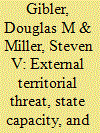

|
|
|
|
|
| Publication |
2014.
|
| Summary/Abstract |
We argue that the regional threat environment a state faces plays a consequential role in its political development and the likelihood of experiencing future intrastate wars. Challenges to a state's territorial integrity lead governments to increase their military personnel, and the resources that support these increases most often come willingly from a public that seeks security. Territorial threats are unlike other types of threats because they challenge individual lives and livelihoods, which both connects the average citizen with the state and allows for easier government extraction of necessary resources. Thus, external territorial threats increase state capacity by unifying the state and by increasing the repressive power of the central government. We identify territorial threats as both latent and realized claims against state territories and find that the presence of an external threat to territory leads to an increase in the capacity of central governments to connect and extract from its citizens, as well as the capacity to repress potential regime dissidents. We also find that the presence of a claim against a state's territory from a neighbor corresponds with a substantial decrease in the likelihood of intrastate conflict at both high and low levels of intensity. The effect of territorial threat is observed even in the short term after a territorial threat has been resolved. Our tests, using standard models of state capacity and insurgency models of conflict on a sample of all states from 1946 to 2007, are robust to multiple model specifications.
|
|
|
|
|
|
|
|
|
|
|
|
|
|
|
|
| 6 |
ID:
127888
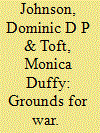

|
|
|
|
|
| Publication |
2013.
|
| Summary/Abstract |
In international relations, unlike the natural sciences, there are few fundamental principles or laws. The world map, however, reveals at least one iron law of global politics: human territoriality. Almost every inch of the globe is partitioned into exclusive and bounded spaces that "belong" to specific groups of humans. Any that is not-such as Kashmir, Jerusalem, and the South China Sea-remains hotly contested. Throughout history, territory has led to recurrent and severe conflict. States are prepared to go to war, and individuals are prepared to die, even over land with little intrinsic value. While such behavior presents a puzzle for international relations theory, a broader evolutionary perspective reveals that territorial behavior has the following three characteristics: (1) it is common across the animal kingdom, suggesting a convergent solution to a common strategic problem; (2) it is a dominant strategy in the "hawk-dove" game of evolutionary game theory (under certain well-defined conditions); and (3) it follows a strategic logic, but one calibrated to cost-benefit ratios that prevailed in our evolutionary past, not those of the present. These insights generate novel predictions about when territorial conflict is more or less likely to occur in international relations.
|
|
|
|
|
|
|
|
|
|
|
|
|
|
|
|
| 7 |
ID:
107275
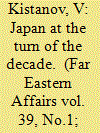

|
|
|
|
|
| Publication |
2011.
|
| Summary/Abstract |
After a half-century or more of almost single-party rule by the Liberal Democratic Party, the Democratic Party came to power in Japan in September 2009. The Japanese people had great hopes for the DPJ where revival of the country was concerned, but a little over a year after the Democrats' resounding victory it was clear that they were incapable of solving a number of long-standing social and economic problems, and were committing one grievous error after another in foreign policy. The author concludes that as the electorate's disappointment and dissatisfaction with the Democratic Party's actions grows, its prospects increasingly wane.
|
|
|
|
|
|
|
|
|
|
|
|
|
|
|
|
| 8 |
ID:
096450
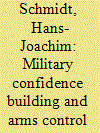

|
|
|
|
|
| Publication |
Frankfurt, Peace Research Institute frankfurt, 2009.
|
| Description |
iii, 40p.
|
| Series |
PRIF report no. 89
|
| Standard Number |
9783937829920
|
|
|
|
|
|
|
|
|
|
|
|
Copies: C:1/I:0,R:0,Q:0
Circulation
| Accession# | | | | | | | | | | | |
| 054962 | 327.174/SCH 054962 | Main | On Shelf | General | | | | | | | |
|
|
|
|
| 9 |
ID:
133495
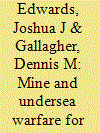

|
|
|
|
|
| Publication |
2014.
|
| Summary/Abstract |
A resurgent regional power in the Pacific has grown successively more aggressive in territorial claims to a number of disputed island groups. Unilaterally establishing air-defense identification zones and stoking nationalistic feelings among its population have spiked international tensions in the region as other nations resist this aggressive behavior. In this powder-keg situation, a tactical miscalculation on the part of one aggressor ship skipper results in a collision between opposing warships. Both countries begin mobilizing for war.
|
|
|
|
|
|
|
|
|
|
|
|
|
|
|
|
| 10 |
ID:
095122
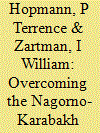

|
|
|
|
|
| Publication |
2010.
|
| Summary/Abstract |
Six authors of the younger generation - three from Armenia and three from Azerbaijan - examine the conflict over Nagorno-Karabakh in a joint effort to overcome their heritage of stereotypes and hostility. While their proposals vary, there is some creative overlap, and all of them recognize the obstacles as four standard characteristics of intractable conflicts: no salient solution, no ripeness, profitability, and no Zone of Possible Agreement (ZOPA). From these obstacles stem some ideas for creative progress, if not immediate solutions.
|
|
|
|
|
|
|
|
|
|
|
|
|
|
|
|
| 11 |
ID:
184492
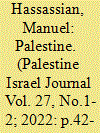

|
|
|
|
|
| Summary/Abstract |
The enigma of peace in the Middle East is the outcome of a protracted conflict between two nationalities and epistemic communities that has gone beyond a territorial conflict and epitomizes today a clash of identity culture and physical existence.
|
|
|
|
|
|
|
|
|
|
|
|
|
|
|
|
| 12 |
ID:
167368
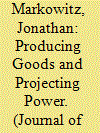

|
|
|
|
|
| Summary/Abstract |
How does a state’s source of wealth condition the domain in which it seeks to project influence? We argue that what a state makes conditions what they take. Specifically, the less states rely on land rents to acquire wealth, the less interested they will be in seeking control over territory and the more interested they will be in securing access to distant markets. We develop and test several observable implications that should follow whether this proposition is true. First, as states become less economically dependent on territory, they should be less likely to fight over territory; second, those states should be more likely to both invest in power projection capabilities and subsequently project power at greater distances. Our findings support our theory. These results are robust across a variety of model specifications that take into account potential confounds, such as regime type, economic development, threat, and geography.
|
|
|
|
|
|
|
|
|
|
|
|
|
|
|
|
| 13 |
ID:
103718
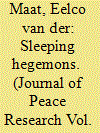

|
|
|
|
|
| Publication |
2011.
|
| Summary/Abstract |
It is not clear why some territorial transgressions lead to intervention by the international community and others do not. As most territorial transgressions lead to a reaction from the international community but a few, however, do not, this study examines the main determinants for non-intervention by capable members of the international community, following violation of the territorial integrity norm by a deviant state. This article focuses on which characteristics of the norm-transgressing state, the conflict, and the state capable of enforcing the norm affect the occurrence of non-intervention. This comparative study examines six major alleged transgressions of the territorial integrity norm - the occupation of Tibet, the Suez crisis, the 1967 six-day war, the Indonesian occupation of East Timor, the Moroccan occupation of the Western Sahara, and the 1989 Gulf crisis - using a multi-methodological approach based on qualitative methods, most notably fuzzy-set Qualitative Comparative Analysis. Analysis reveals that the absence of high security costs to the hegemon in combination with (a) strategically important security relations between the transgressor and the hegemon or (b) absence of military and economic vulnerability are generally necessary and sufficient for non-intervention.
|
|
|
|
|
|
|
|
|
|
|
|
|
|
|
|
| 14 |
ID:
137625


|
|
|
|
|
| Summary/Abstract |
This article critically analyses an intuitive and influential conceptual framework by which to understand state strategy in territorial conflicts. According to this framework, a state in a territorial dispute can pursue one of three general strategies: threaten or use force; offer territorial concessions; or delay. This article argues that it is problematic to regard these three candidate strategies as mutually exclusive. It is argued that not only can a strategy of escalation be compatible with one of delay, but many uses of force can be employed instrumentally in service of delaying. The framework, this article contends, does not so much capture “strategy” as it does certain aspects — or outcomes — of strategy, which while appropriate for certain analytical tasks is less so for others. The 2012 Scarborough Shoal incident is examined and China’s strategy during the event is scrutinized with a view towards assessing the strengths and weaknesses of applying the framework to an analysis of narrower scope. Lastly, it is argued that a framework for conceptualizing state strategy in territorial disputes should not be confined to three alternatives; it should be more broadly constructed, allowing for more nuance and taking seriously all the domains of statecraft.
|
|
|
|
|
|
|
|
|
|
|
|
|
|
|
|
| 15 |
ID:
157353
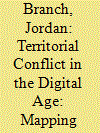

|
|
|
|
|
| Summary/Abstract |
This article examines the central, though understudied, role that a rapidly changing technology—mapping—plays in territorial conflict. As digital cartographic tools replace traditional paper maps, both the processes and outcomes of negotiation over territory change fundamentally. Digitization does not simply produce “better” maps that make settlements easier to reach. Instead, particular features of digital mapping reshape disputes over territory by altering the evaluation of possible solutions, changing the perceived value of territories, and bringing new actors into negotiation processes. Those effects are complex and context-sensitive. They promote conflict resolution in some circumstances but pose new obstacles to settlements in others. This article combines theory on mapping, negotiation, bargaining, and emotions in international relations. I first develop a set of general implications of digital mapping for the processes and outcomes of territorial negotiation. I then examine three illustrative cases: the 1995 Dayton Accords, the Eritrea-Ethiopia Boundary Commission, and the 2010 border dispute between Costa Rica and Nicaragua. In each case, new features of digital mapping yielded unexpected effects on negotiation and dispute-resolution processes.
|
|
|
|
|
|
|
|
|
|
|
|
|
|
|
|
| 16 |
ID:
162246
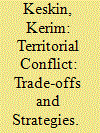

|
|
|
|
|
| Summary/Abstract |
We study a war scenario in which the winner occupies the loser’s territory. Attacking a territory increases the chance of winning, but also causes harm, which in turn decreases the territory’s value (i.e. the reward of winning). This paper highlights the effects of this trade-off on the equilibrium strategies of the warring states in a contest game with endogenous rewards. Providing both static and dynamic models, our analysis captures insights regarding strategic behavior in asymmetric contests with such conflict.
|
|
|
|
|
|
|
|
|
|
|
|
|
|
|
|
| 17 |
ID:
132352
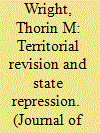

|
|
|
|
|
| Publication |
2014.
|
| Summary/Abstract |
Does involvement in territorial conflict affect domestic repression? I argue that seeking to revise territory abroad will affect domestic repression, but conditionally on regime type and conflict severity. For democracies, there may be public pressure to deliver the good of territory. Because of this, territorial revision can lead to in-group/out-group dynamics at home, making it politically beneficial to increase repression domestically against groups seen as being opposed to the conflict. Autocracies may place a different value on contested territory, as they rely on the distribution of private goods to maintain support. While in-group/out-group dynamics may also be in play for autocracies, such states also face different types of constraints than democracies. Autocracies are more likely to use their military for domestic repression, and thus are more likely to simply maintain or reduce repression because the military is now being used abroad. These propositions are tested cross-nationally by examining repression when states are revisionists in conflicts over territory spanning from 1977 to 2001. The results of ordered logit analyses of state repression show that democratic states become more likely to increase repression when they are territorial revisionists, as those conflict-years become more deadly, while autocratic states are less likely to increase repression during the same periods.
|
|
|
|
|
|
|
|
|
|
|
|
|
|
|
|
| 18 |
ID:
177994
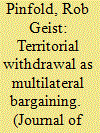

|
|
|
|
|
| Summary/Abstract |
This essay tests competing scholarly approaches to territorial withdrawal in two cases seldom scrutinised by theorists: the Israeli exits from the Gaza Strip and southern Lebanon. The dominant framing of these cases as ‘unilateral’ suggests Israel withdrew without bargaining with actors in the international system. These cases therefore apparently illustrate the primacy of domestic politics in facilitating or precluding withdrawal. Yet, this essay delineates often-overlooked causal paths emanating from: (1) violent Israeli bargaining with the enemy and (2) diplomatic Israeli bargaining with third parties. Hence, this essay demonstrates withdrawal is dependent on bargaining with external actors, even in ‘unilateral’ cases.
|
|
|
|
|
|
|
|
|
|
|
|
|
|
|
|
| 19 |
ID:
189006
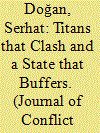

|
|
|
|
|
| Summary/Abstract |
We present a game-theoretic approach to the analysis of the emergence or survival of buffer states. We analyze a two-stage game with three players orderly located on a linear territory, where the player in the middle is passive, and the players on the two ends are aggressive with options to declare war against the others. We conduct an equilibrium analysis and characterize the conditions under which the passive player acts as a buffer state between the aggressive players. We find various equilibrium outcomes, which can be grouped into the following categories: (i) peace with buffer, (ii) peace without buffer, and (iii) the last man standing. Our comparative static analyses reveal valuable insights regarding the factors affecting the existence of buffer states.
|
|
|
|
|
|
|
|
|
|
|
|
|
|
|
|
| 20 |
ID:
067392
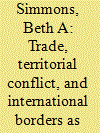

|
|
|
|
|
|
|
|